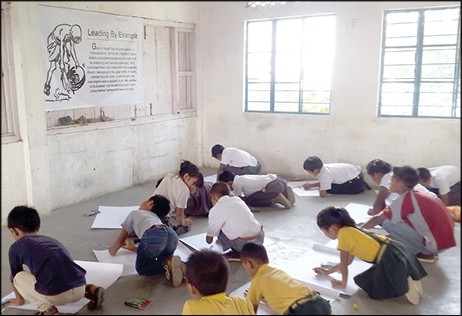Representational Image. (Morung File Photo)

Morung Express Feature
Zunheboto | May 15
At a time when the youth in Nagaland are growing up hearing that “buying a job” is normal, schools can make an intervention to teach that “hard work bears fruit.”
Tokavi Suu, Managing Director of CornerStone School in Zunheboto Town reflects on this. He is in conversation with Pikali Jimomi, a teacher at the Government Higher Secondary School, Zunheboto (GHSS). They are discussing the ups and downs of private and public schooling in Nagaland State with The Morung Express.
Both recognise the importance of value based education but each straddles very different realities, which necessitate different strategies. In the recently declared HSLC and HSSLC results, private schools all over the State performed better than government schools—at the Zunheboto GHSS, only 6 out of 216 students who appeared for the HSLC examination passed.
“Government school teachers are very qualified and they are paid better but the management of the schools fail,” says Jimomi, explaining why basic education falters in many government-run schools. Teachers are, allegedly at times, drunk at work, some play cards in school, while in the deep interiors, some hire much less qualified “proxies” to do the teaching for them.
It is up to the administration to keep a check on these aberrations, and private schools score on these markers.
“Teachers are paid lower in private schools but we create an environment that is healthy for them. For us, building relationships is very important,” explains Suu. They organise gatherings, outings, special trainings and special guests come to motivate the teachers. At the same time, attendance (of teachers) is taken every day and the administration makes sure no teacher leaves the school compound during school hours.
Tokavi Suu and his wife Inakali Suu transformed an existing former school to CornerStone in 2010, bringing in modern teaching methods and much needed vibrancy to Zunheboto Town. Recognising this as “God’s calling,” their school, affiliated to the Nagaland Board of School Education, today hosts 860 students with a distribution of 35-38 students per class.
Infrastructure, such as good toilets, is a key element to keep both students and teachers in a healthy schooling environment. Despite adequate funding, government schools fall back on this element too. “It is hard to go to the toilets in our school. Even the building leaks during rains and classrooms become puddles,” notes Jimomi of the Zunheboto Town GHSS, making it difficult for regular and healthy attendance at school.
But government schools take the pie in terms of free schooling, making education available to all. On the other hand, private schools like CornerStone charge Rs. 750 per month per student till class 6, Rs. 800 per month from class 7-10 and Rs. 900 per month for higher secondary, all excluding textbooks, stationery etc.—affordable to a middle income Naga family but difficult for the poor.
To get around this, Suu has started scholarship schemes for poor and deserving students; sponsorship comes from well-wishers. On the other hand, some government schools in Zunheboto are applying exactly the opposite scheme—they are charging their students fees up to Rs. 2000 for a year. “Some of the students who seek admission to government schools are so naughty that no other school is ready to keep them. So parents are willing to pay,” informs another government school teacher on the condition of anonymity. It is not clear where these funds are directed to. Way forward Taking into account all variables, a way to move forward would be to create a collaboration of government and private run schools. Joint workshops for teachers as well as students of both types of schools could be organised, and teacher exchange programs could also be put in place—well qualified and trained government teachers could provide their expertise to private schools while private schools could give school management training to government schools.
It is in empowering each other that the next generation stands empowered. “If the new generation does not change, we have no hope as a society. Corruption has become a way of life, and the only way forward is that the older generation phases out leaving the young ones to bring change,” says Tokavi Suu. For this, both Suu and Jimomi suggest, education needs to fall into place and if the government simply takes care of what infrastructure and resources already exist, it would be enough.






